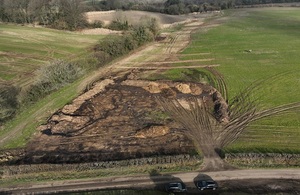Farmer Derek Dyer contaminated a private water supply and polluted a stream after a slurry store built from farmyard manure collapsed.
In a case brought by the Environment Agency, Dyer, aged 74, of Crawley Farm, Yarcombe near Honiton, received a community order of 60 hours unpaid work and was ordered to pay total costs of £15,388.40 and surcharge of £114 by District Judge Smith at Exeter magistrates on Thursday, May 9.
The farmer admitted one charge of causing pollution and two charges related to the construction of an illegal slurry store at a field off Greenway Lane, Clayhanger, Combe St Nicholas, near Chard.
The Environment Agency stated the pollution was traced to a large structure made from farmyard manure which had been constructed to store slurry.
It added that part of one of the walls had collapsed resulting in the entire store contents pouring out and causing widespread contamination and damage.
The court heard that agency officers went to the field in January 2023 following several reports of pollution in a tributary of the River Isle.
The Environment Agency stated the slurry flowed across two fields and down the hillside into a wooded area. The volume of slurry was such that it left behind a “track” up to 20m wide in places and the force was such that two wire fences were damaged.
The tideline left on fence posts indicated a depth of 12 inches of slurry flowing into a wooded area over 400m from the store location.
Extensive contamination occurred within the wooded area where springs supply drinking water for several properties on the Chilworthy Estate.
The court heard the estate provided bottled drinking water to all residents as soon as they became aware of the potential pollution of their water supply.
The Environment Agency stated the water samples of the drinking supply later confirmed elevated levels of E.coli and total coliforms above drinking water standards.
A wild swimming pond at a nearby glamping site had also been polluted with slurry.
In a statement submitted to the Environment Agency, Derek Dyer admitted that he and his son had used the rented field for the store because they did not have sufficient slurry storage and that an application for a new store had been delayed by the local planning authority.
The farmer expressed regret for what happened, believing the makeshift store would hold up slurry until it could be spread, but claimed the heavy rain had caused it to collapse.
Summing up, district judge Smith described the act of building a slurry store from farmyard manure as reckless, and concluded that Dyer, with all his years of experience, should have known better.
Dave Womack of the Environment Agency said: “In over 30 years of regulating farms I have never seen such extensive contamination by slurry. Mr Dyer showed a flagrant disregard of the law.
“Regulations which prescribe how to construct slurry stores have been in place since 1991 and all farmers need to follow some basic requirements to prevent catastrophic events like this from happening.
“If farmers are concerned about the storage capacity of existing facilities, we would advise that they contact their local Environment Agency office and discuss proposals to ensure the environment is properly protected and valuable nutrient resources aren’t wasted,” Womack said.


